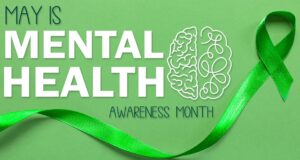Mental health is a topic that's becoming more prevalent in the security industry. But while mental health is finally being talked about more openly, we still have a long way to go. This Mental Health Awareness Month, we want to spread stories, resources, and valuable information that will hopefully help security professionals and anyone out there when dealing with mental health.
- As security professionals, we're often hired to protect others. But sometimes protecting yourself is just as important. -
What is Mental Health
Mental health refers to how we feel and think, and our ability to cope with life's ups and downs. It's a state of well-being that includes emotional, psychological, and social aspects of our lives. Just
This Mental Health Month, challenge yourself to examine your world and how it can affect your overall health. Look around, look within – from your neighbourhood to genetics, many factors come into play when it comes to your mental health.
Commitment to Mental Health
At Paladin, we believe that mental health help should be accessible to everyone. That's why we're tackling this taboo subject head-on by providing an extensive list of resources for our employees and now, for you too, so that you can get the help you need when it's right for you.
To keep our communities safe, we must first take care of ourselves, and Paladin cares. As part of our commitment to supporting mental health, all Paladin employees have access to free confidential counselling services through our Employee and Family Assistance Program (EFAP) for any kind of help — whether it’s a mental health issue or managing day-to-day stress. Also, our Lone Worker Program is designed to identify ways to take care of your physical, mental, and emotional well-being while working alone.
Safety is our #1 priority and the heart of what we do. That’s why our security professionals can take advantage of specialized training courses on our ever-evolving online learning platform, Paladin University. With over 200 courses available, including many mental health-oriented trainings, we cover topics ranging from legal and safety issues to common mental health disorders, effective communication, and appropriate responses. This is essential for security officers who may encounter others with mental illness, whether they work in healthcare security or not.
Additionally, many Paladin trainers are certified to teach suicide intervention and mental health training through the ASIST (Applied Suicide Intervention Skills Training) program. By offering courses like these, we ensure our security professionals are supported and demonstrate the importance of proper training when it comes to dealing with mental health.
Mental health is a huge part of our lives, work, and communities. As part of our 4 Seasons of CARE, every year we champion adequate funding to frontline mental health and addiction programs across Canada in partnership with the Dollar A Day Foundation.
Mental Health Through the Lens of Our Professionals
In The Difference Makers podcast, we dive into everything security and explore the journeys of those who go above and beyond to make our world a safer and friendlier place.
Listen to People & Culture Specialist Robyn Beach talk about their own struggles with mental health illness and impactful ways to Tackle the Stigma:
Tune in with Senior Trainer/Facilitator Norm Bettencourt about The Power of Proper Security Training and how an empathy-led security model and a compassionate approach to people with mental health issues, truly make a difference:
Early Warning of Mental Health
Not sure if you or someone you care about may be struggling with their mental health? Experiencing one or more of these feelings, symptoms, or behaviors can be an early warning sign of an issue.
- Eating or sleeping too much or too little
- Pulling away from people and usual activities you enjoy
- Having no motivation and/or low or no energy
- Feeling numb or like nothing matters
- Having unexplained aches and pains
- Feeling helpless or hopeless
- Smoking, drinking or using drugs more than usual
- Feeling unusually confused, forgetful, on edge, angry, upset, worried, or scared
- Having persistent thoughts and memories you can't get out of your head
- Hearing voices or believing things that are not true
- Thinking of harming yourself or others
- Inability to perform daily tasks like taking care of your kids or getting to work or school
What You Can Do to Improve Your Mental Health at Work
- Don’t let the stigma of mental health scare you. If you think you need help, talk to your supervisor/manager or use any of the resources listed here
- Speak up if you have concerns about anything in the workplace:
- Health hazards
- Unreasonable work expectations,
- Worried about someone’s well-being
- If you see a colleague that may be struggling with mental health, talk to them or discuss with your supervisor or manager
Join us on this journey to becoming the best security professionals we can be and making the world a safer and friendlier place!
Paladin's company-paid and on-the-job training ensures that newcomers to security are ready to perform with the tools and confidence they need to succeed. If you are ready to jumpstart your career in security, check out our careers page.
Here is a free downloadable template on How to Write the Ideal Security Guard Resume and a step-by-step guide on How to Become a Security Guard in Canada.
















